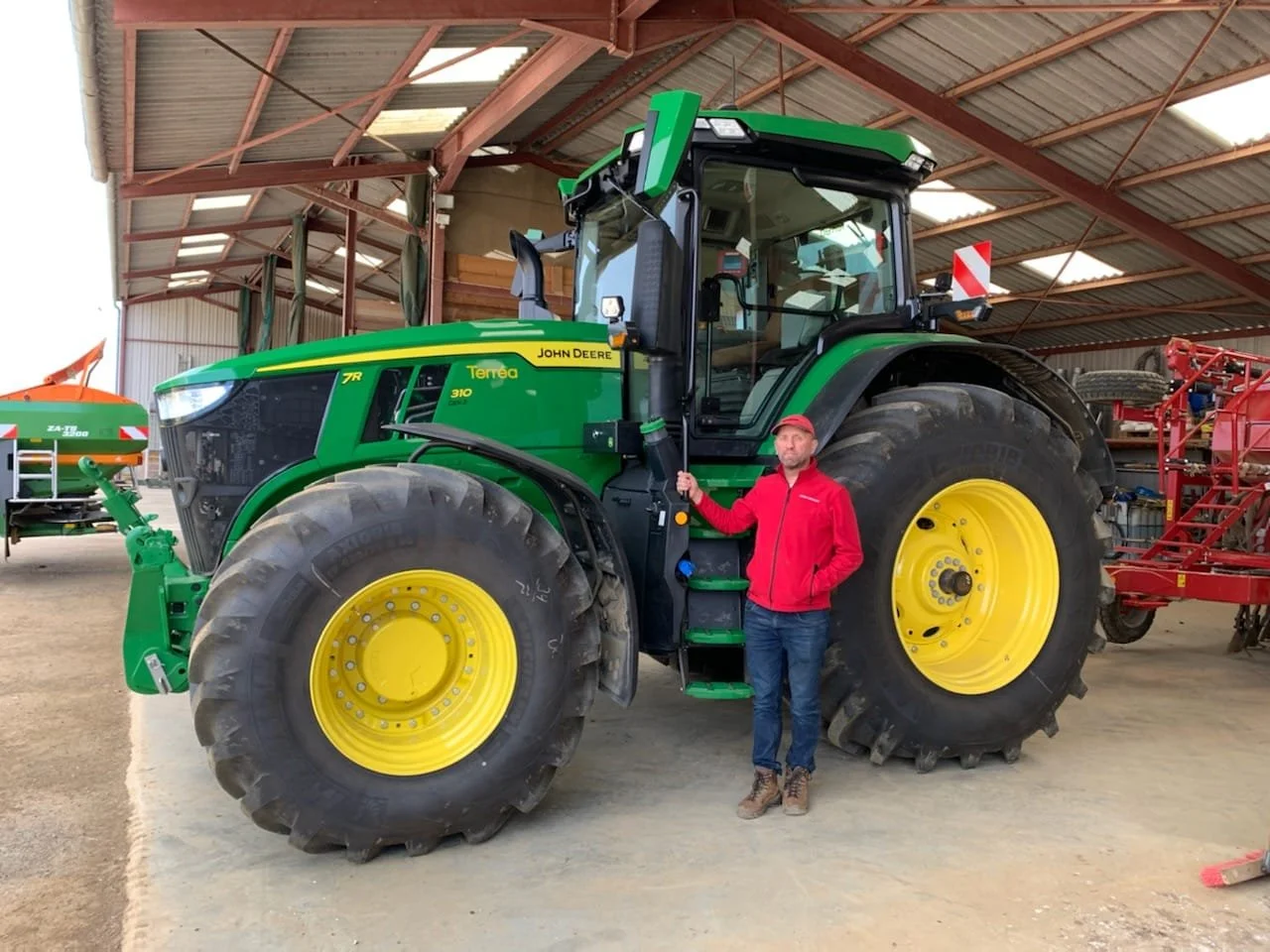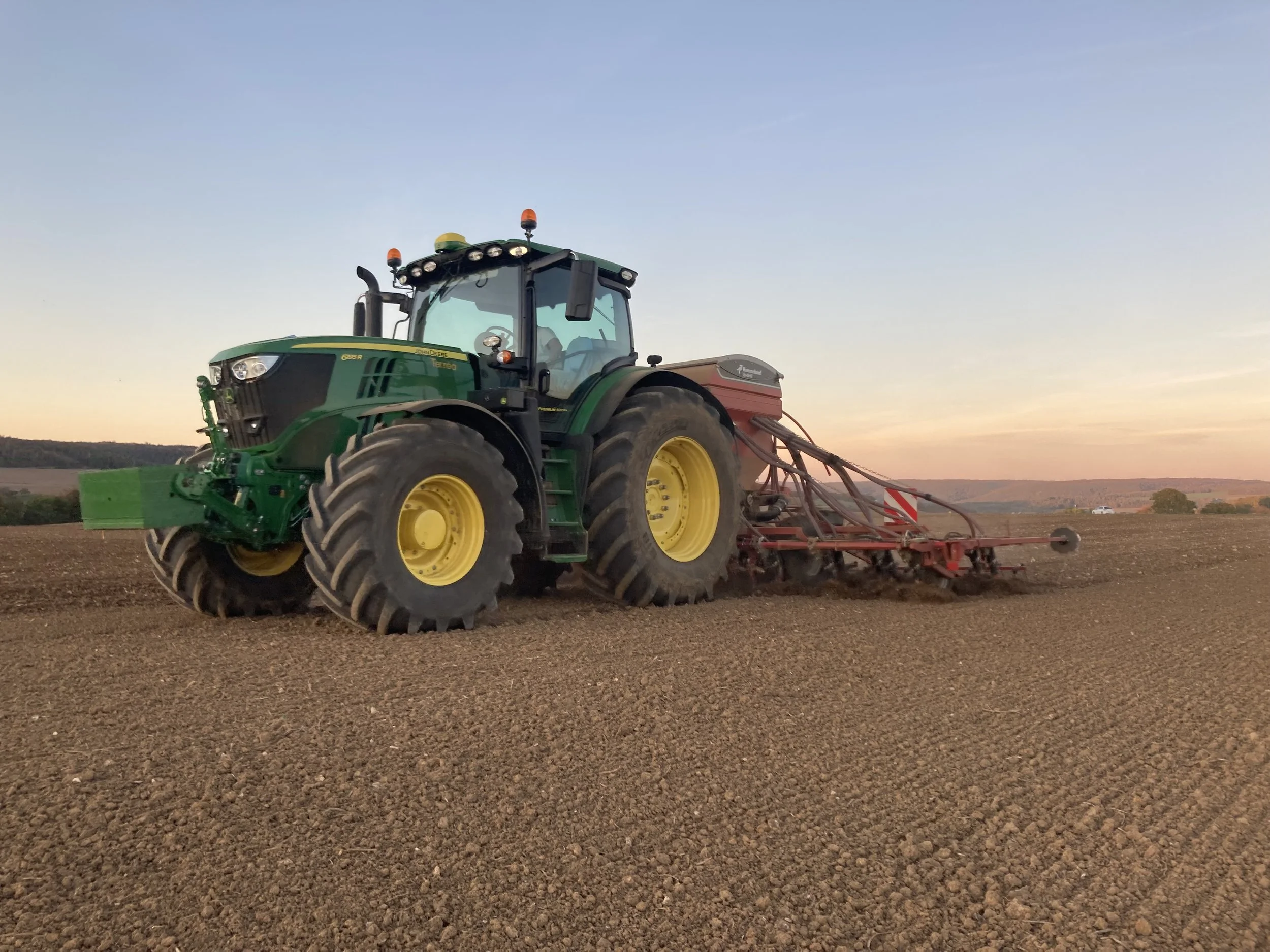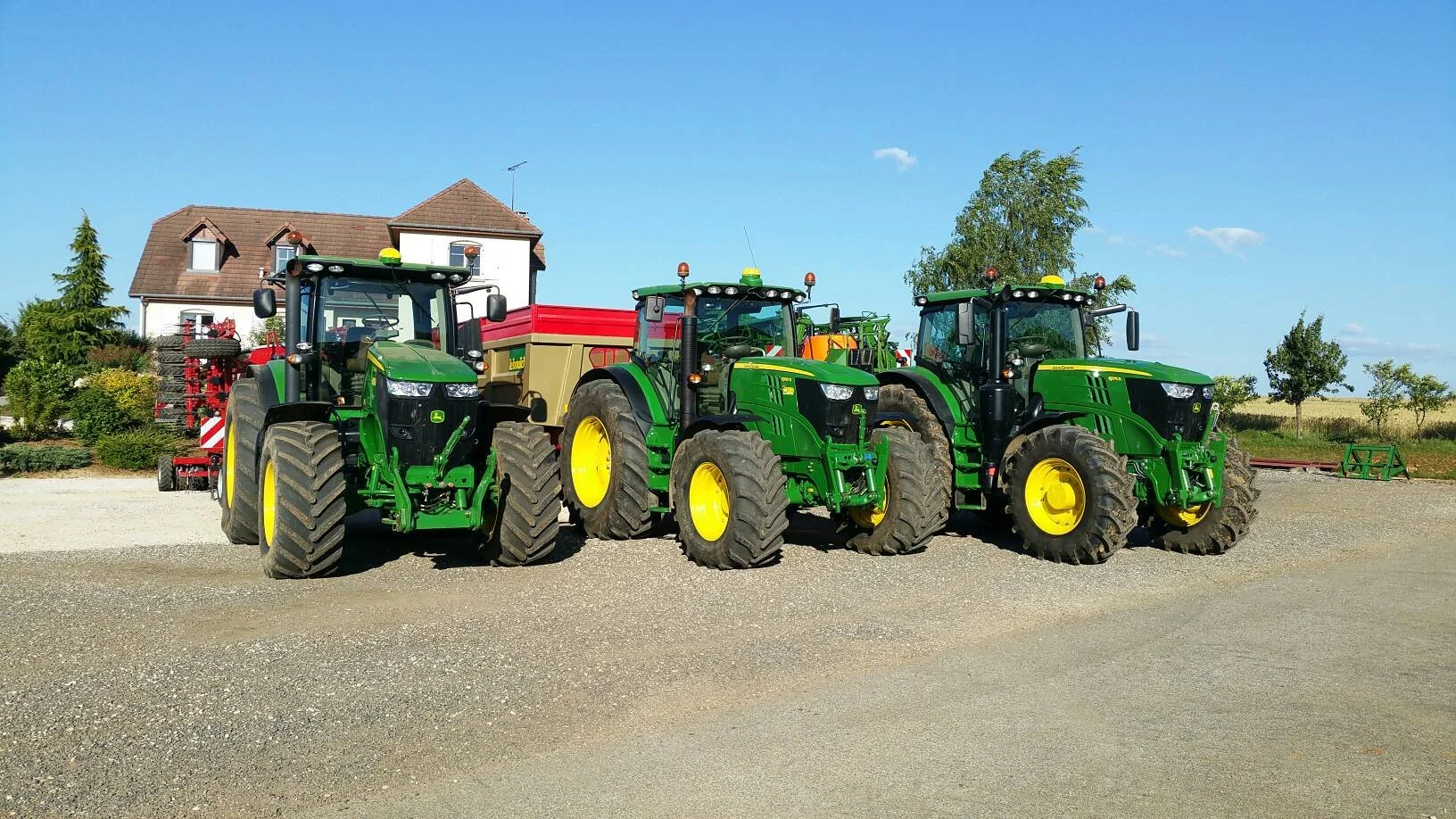The Family farm
« An agricultural revolution is coming. »
Summary of the Hay Season 2023
Today I will introduce you to Didier Guillaumot, manager of the family farm. He is a person who inspired me a lot during my life. He has always thought differently, trying to make his farm evolve so that it can adapt to the evolution of the agricultural world. The interview was the opportunity to go back over his career, understand his vision and get his advice. But also to talk about the future, innovation, organic and sustainable agriculture.
Reception of the John Deere 7R310, Didier 2021
1- Introduce yourself quickly, your experience, key dates and current state of the farm.
I am 59 years old and I have been a cereal farmer for 40 years now. Following a health problem contracted by my father, I took over the family farm in 1982, which was in organic at that time, I was 19 years old. With a scientific background, I learned by working over the years. In my early days and until 1997, the farm was 90 hectares and included a dairy farm. In 1997, my parents-in-law and I decided to specialize in cereals and to work together until 2013, when I took over their farm after their retirement. Today the farm is 256 ha plus 220 ha that I undertake for third parties, all in conventional agriculture.
Ford 2000, one of the first tractors of the farm still in use
2- What have been the big changes in your business since you took over the family farm?
« We went from the wading pool to the Olympic pool ». Indeed, at the beginning, it was enough to work to earn money. You could not just do anything either, management had its role to play but everything was much simpler. You stored grain, you sold it, the agricultural prices were French and stable. We had no regulations for phytosanitary products, fertilizers, it was almost total freedom. Then, in the 90s, the Common Agricultural Policy (CAP) and the beginning of the opening of the markets changed everything. We had to orient our production and our reasoning according to the CAP grants to ensure a little security, because world prices were unstable, so we had no guarantee of prices. At the same time, environmental regulations began to emerge.
One of the three places where grain is stored, John Deere 7R310 x Maupu, 2021
3- What, in your opinion, makes a cereal farmer successful today?
When you are a cereal farmer, no matter how well you work, almost all the results of the year are based on the sale of your production and the purchase of your inputs on the international markets.
« Having cash-flow to be flexible ». For me, the first step is to avoid depending on cash flow needs, otherwise we cannot be master of our sales and purchases. Have cash in advance and ideally, a year in advance! At the beginning it is difficult to have this advance but it must be the first objective. When you have cash, you have the possibility to buy and sell at the best time. For example, I have noticed that fertilizer is more affordable in the spring and tends to go up a bit during the year. I have always gotten good prices. However this year the price of fertilizer has gone completely crazy and prices have tripled. So even with experience, you cannot control everything in this business, and that makes it very difficult !
« No miracle solution ». As for the sales of the productions, it is the same principle, unfortunately I do not know the miracle solution. With experience I realized that I got better results by splitting my operations over a long period. It is a kind of technique to secure an average price over the whole year.
« Invest and manage ». Finally, there is another important criterion for success: you have to manage, invest and optimize the taxation of the farm. A farm is like a business, investing is the key. It is absolutely necessary to invest in recent equipment to avoid repairs, storage to keep flexibility on sales if we want our farm to remain competitive and sustainable.
Harvesting season 2023
4- What are for you, the main challenges for French cereal farmers in the coming years ?
« An agricultural revolution is coming ». As we have seen this year, managing the vagaries of the markets is the first challenge for cereal farmers. The stratospheric evolution of raw materials will reshuffle the cards and perhaps reorient production. The new CAP will also be decisive, especially with its carbon fee, its sanitary and environmental regulations, especially due to global warming. So many parameters with which it is still difficult to take a position yet. In any case, the dynamic will be to produce as much and better, because the world population continues to increase, but not our resources.
« Farmers will need support ». Finally I see a last challenge, it is the arrival of new technologies in our sector. The agricultural equipments got sophisticated since I started, but what seems to happen is even greater. I am sure that an agricultural revolution is underway, and I do not know if farmers are ready to work with all these technologies. Helping them in this transition will be crucial.
Seedlings with 6150R x Kverneland Seedern, 2021
5- How farming will evolve in the next few years ? What do you think about responsible and organic agriculture?
« Robotisation could be the solution ». I would need a crystal ball to know in advance how the markets will evolve. More seriously, I am really waiting for machines that could replace herbicides, fungicides and insecticides on a large scale. Robotisation can be the solution to these problems. It remains to be seen whether the investment in this technology will be recouped through increased production or valued through better prices. This being the case, I think that field crops farmers will be at the bottom of the list, because our production per hectare is low and our surfaces are huge.
« 100% Organic is not the solution ». For the moment, producing 100% in organic is not the solution, we do not have the capacity yet. Growing organically does not produce enough, especially in a context where the world population is growing by 100 million every year. Moreover, the economic model and the market for organic farming are not yet profitable on a large scale and in the long term. What allows farmers who produce organic to live, are the various aids they receive, on production, on equipment ...
« Good agricultural practices must be rewarded ». On this subject, we can take the example of land that is bare during the winter, this is not normal. Covering the land with vegetation, in addition to the agronomic benefits, allows the consumption of carbon dioxide, the main cause of global warming. Unfortunately, the cover has a cost and there is no grants to encourage us to put in place these good practices. Grants already exists for other systems that are less beneficial to the environment, such as adding clover to a cereal crop.
« We have to evolve ». Finally, it is certain that with the depletion of resources and the increase in population, we will have to produce more and consume less. And consumers also have their role to play in the process, by consuming more locally, less meat ... We may also have to use hydrogen or electric machines ? More input-saving or robust plants ? All I know is that we have to evolve and the new generation will find the solution !
JD 7230R x Horsch Sprinter - 6175R x Leboulch - 6195R x Amazone UX, 2020
Want to learn more about the family farm ?
WANT TO LEARN MORE ABOUT technologies AND THEIR EVOLUTION, THESE MAY HELP YOU !
Want to better understand new agricultural technologies ?
AgTech Market | AgTech Expertise
What do other farmers think about robotics and investment ?
The Family Farm | Conventionnal Field Crops Farms in France
Robot in the vineyard : Replace Glyphosate robotic soil cultivation | French wine grower experience with a robot
Robot in the vineyard : Saving time by automating soil cultivation | French wine grower experience with a robot







